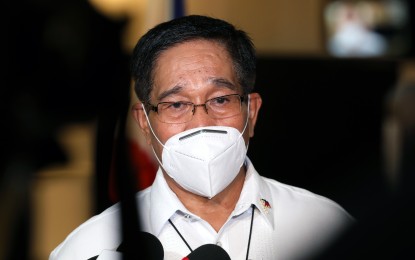
National Security Adviser Hermogenes Esperon, Jr. (PNA File photo)
MANILA – The Anti-Terrorism Council (ATC) cannot order the arrest of persons suspected of terrorism, National Security Adviser Hermogenes Esperon, Jr. clarified in an interview with CNN Philippines' The Source on July 2.
Esperon told program host Pinky Webb, said ATC is not a judicial body or a quasi-judicial body and that it can only order the arrest after proscriptions or after designations.
"Proscription is taking to the court, to the Court of Appeals and filing petitions against organizations and personalities so that they will be listed as terrorists. The designation on the other hand is what would come from the Anti-Money Laundering Council and these are organizations that could be supporting terrorist acts. The designation also refers to the organizations that are already proscribed or listed in the United Nations Office of Counter-Terrorism," Esperon clarified.
The ATC would be composed of nine members of the Cabinet including the Executive Secretary, National Security Adviser, Secretary of Foreign Affairs, Secretary of National Defense, Secretary of Interior and Local Government, Secretary of Finance, Secretary of Justice, Secretary of Information and Communications Technology, and Executive Director of the Anti-Money Laundering Council.
He added that there are already foreign and regional-based organizations listed as terrorist groups by the United Nations.
"By resolutions of the United Nations Security Council, we are bound, we are encouraged, and we are bound in fact to follow those designations. So the ATC is not allowed to simply declare people as terrorists," he added.
Esperon said the arrest of individuals or groups suspected of terrorism will only come once the organization is proscribed.
"That power comes only after the organization is proscribed, we have to go to court first. Even the matter of surveillance of organizations and personalities has to be by order of the court and we apply for it," he said.
By the court, Esperon said he is referring to the Court of Appeals
The ATC, he said, could only designate terror groups or individuals by complying with the resolutions of the United Nations Office of Counter-Terrorism.
"Now, once we have proscribed organizations, then that is the only time that we designate agents, we designate agents with written authorities to arrest because you cannot just allow anybody to be conducting an arrest. This is a very technical job and so they must be trained for it," he said.
A written authority will come from the ATC, he added.
When asked if the ATC can be politicized due to its composition of nine Cabinet secretaries or members, Esperon said there are safeguards for such matters.
"For one, there will be a joint oversight committee by Congress and we report our arrests to the Commission on Human Rights as well as to the courts. And by the way, after the passage of this law, we will also craft our Implementing Rules and Regulations and this will also be submitted to Congress. And so there goes again the balance, the check, and the safeguards," he added.
He said terrorism should not be politicized as it is a security matter that needs to be addressed.
He added that activism is not terrorism and that claims that the new anti-terror law would infringe on civil and political rights are not true.
"That is prohibited under the definitions of terrorism, Section 4 which states that it shall not include advocacy, protest, dissent, stoppage of work, industrial or mass actions and other similar exercises of civil and political rights. And so, it does not include people going to the streets if they have legitimate grievances and the exercise of course of freedom of expression," he added. (PNA)
